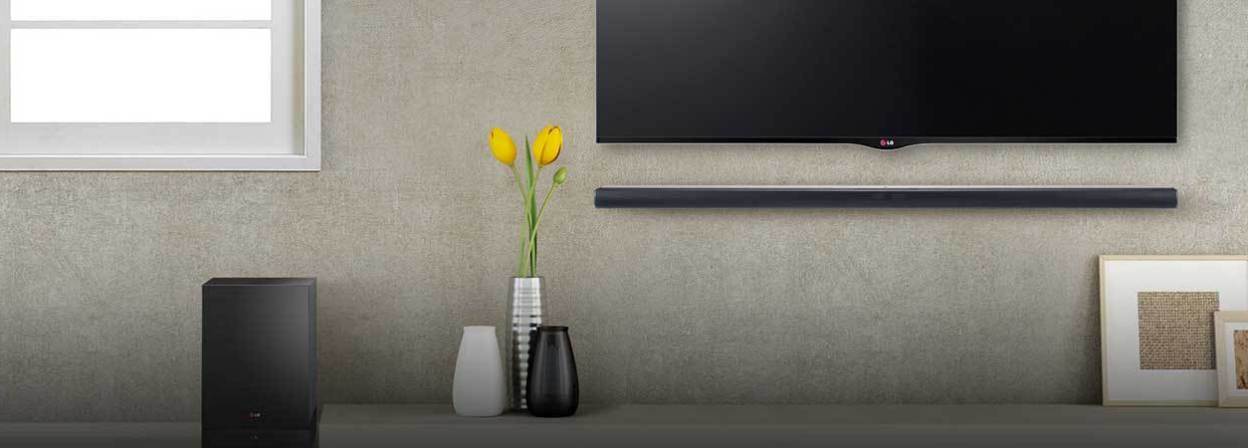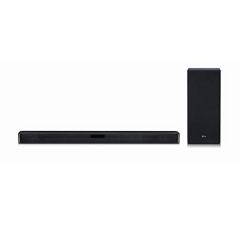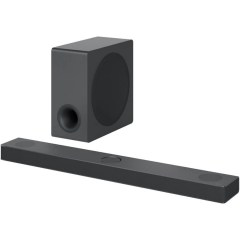Buying guide for Best LG soundbars
One of the dirty secrets of the home theater industry is that most modern TVs – even the fancy 4K models – have terrible speakers. TV and projector manufacturers focus their attention on the visuals of your movies and TV shows and rarely put significant effort toward including quality audio, primarily because they’re counting on consumers to bring their own audio solutions.
When it comes to improving your TV’s audio, you’ve got two options: you can build a multi-speaker surround-sound setup complete with an AV receiver and anywhere between three and 12 speakers, or you can buy a soundbar. For most people, the cost and effort involved with a multi-speaker setup is off-putting – and using a single soundbar delivers an audio experience that’s almost as good.
At BestReviews, we’re on a mission to provide the most reliable and unbiased product reviews on the internet. We believe in looking at products from all angles – the pros, the cons, and the compromises – and helping our readers make the best choices based on their needs. Keep reading for our take on LG soundbars. Then, when you have an idea of what features you need and how much you want to spend, check out the table above to see which models we recommend most.
Soundbar audio formats, demystified
Soundbars have one job: to make your TV and movies sound as good as they look. Unfortunately, determining which soundbars are up to the task can get rather complicated because not all soundbars support every audio format you’ll encounter. Here’s a quick rundown of the different audio formats you’ll see listed in connection with soundbars and what they mean.
Dolby Digital
Dolby Digital is the most common digital surround format available. A Dolby Digital signal can carry sound information for as many as eight speakers, but it can also work through as little as one speaker. Most broadcast television – including TV accessed through a cable box – comes with Dolby Digital audio.
Dolby Atmos
Dolby Atmos is Dolby’s take on “object-based audio,” which adds an additional two to four speakers to a traditional 7.1 speaker setup. The additional speakers are typically positioned in the ceiling above the viewer where they create “height” audio, meaning they’re able to work with other speakers to place specific sounds in specific areas of the room. Best of all, Dolby Atmos is dynamic, so the setup process will calibrate to your specific viewing area and create the perfect soundscape for the environment. When LG soundbars list support for Dolby Atmos, that means they include two to four additional up-firing speakers which will simulate the effect of ceiling speakers. Dolby Atmos is currently found on 4K Blu-rays and some streaming services, and make no mistake, it represents a huge step forward from prior audio formats.
DTS
Digital Theater Sound (DTS) is a rival to Dolby Digital that can be found on many DVDs and some streaming apps. Although it’s less common than Dolby Digital, it’s a step up in audio quality. Both Dolby Digital and DTS are compressed audio formats, meaning they don’t have all of the fidelity of the original recording – but they both still sound pretty great.
DTS-HD-MA
Digital Theater Sound High Definition Master Audio is the upgraded version of DTS. It features uncompressed audio in up to eight speakers. Uncompressed audio is a major improvement because you’re hearing the soundtrack unaltered. Conversations in DTS-HD-MA sound up close and personal; action scenes will make your living room sound like a war zone.
DTS:X
Digital Theater Sound:X is the competing audio format to Dolby Atmos. Much in the way that Dolby Digital is found everywhere (but DTS is superior), DTS:X is a more capable format than its more commonly found closest competitor, Dolby Atmos. DTS:X also features object-based sound, but with DTS:X, you can manually adjust specific sound objects. For example, if a center channel is playing dialog as well as music or additional background audio, DTS:X can isolate the dialog and increase the relative volume. (With other formats, you can adjust the entire volume of the center channel, but DTS:X takes it to a new level of specificity.)
While they are made by LG, the LG soundbars we research and recommend are great for use with nearly any modern TV.
Sound quality is one of the most important factors we consider when determining which LG soundbars are the best.
We take careful note of the dimensions of each LG soundbar we recommend to make sure our readers find one to match their current entertainment setup.
We consider LG soundbars that focus on center channel audio in surround sound setups as well as those meant for standalone use.
A solid construction and premium fit and finish are two important aspects we find when digging into the specifics of LG soundbars.
Some of the LG soundbars we explore are designed to fit seamlessly with the design of LG’s high-end TV sets.
In our reviews, we note which LG soundbars fit between TV legs without mounting or modification, as that is by far the simplest way to install a soundbar.
We closely examine relatively standard and affordable LG soundbars as well as advanced, low-profile models meant for wall mounting.
The top LG soundbars we research offer a range of connectivity options for use with home theater systems as well as high-fidelity home stereos.
We give special consideration to LG soundbars with individual speakers firing in different directions, which makes for more effective spatial sound and helps take advantage of Dolby Atmos audio.
LG soundbar prices
LG offers a wide variety of soundbars in a broad range of price points. As you’re considering how much you want to spend, keep these price ranges in mind.
Inexpensive
Between $100 and $199, you’ll find some competent LG soundbars with basic format support and a minimal number of speakers. On the low end of the range, you’ll see stereo-only models made for smaller TVs. As you get closer to $200, you’ll find models that include subwoofers and more connectivity options. If you need a basic soundbar for a small room like a den or a dorm room, you’ll find some terrific options for making your music and movies sound better for less than $200.
Mid-range
Between $200 and $399, LG soundbars offer bigger sound and more speakers. In this price range, you’ll find models that support 5.1 and 7.1 setups that use up-firing speakers to bounce surround audio around the room. If you have a TV that’s 55 inches or larger, or if you’re ready to try out the most common premium audio formats (like DTS-HD-MA), you’ll find terrific options in this range.
Expensive
Between $400 and $1,000, you’ll find LG soundbars that can handle any format, simulate powerful surround sound, and support any giant-screen TV. If you want to add object-based surround sound to your TV room, or if you want to play back your high-resolution music files, get ready to look at the pricier options.
Did you know?
Some LG soundbars include built-in Chromecast functionality, so you can “cast” any audio content directly from your smartphone to your soundbar to enjoy it in high fidelity. Casting is a bit simpler than Bluetooth, and it yields better-quality audio.
STAFF
BestReviews
Tips
As you’re shopping for an LG soundbar, consider these tips.
-
Measure the horizontal width of your TV before shopping for a soundbar. The TV sizes that we talk about (like 55 or 65 inches) actually measure the diagonal distance of the TV screen, but when you’re looking at soundbars, you need to know the width of the set. Once you know how wide your set is, you can then get a sense of how big of a soundbar to buy. Your LG soundbar doesn’t have to be the exact same width as your TV, but if it’s too small or too large, it may look peculiar underneath your TV.
-
If you plan to mount your LG soundbar to a wall, make sure you are drilling into the studs behind the wall for optimal stability. Soundbars can be heavy, and if you mount one on drywall alone, there’s a decent chance it will come crashing down before too long. Don’t take any chances – even if you have to buy a stud finder to determine where they are.
- If you buy an LG soundbar that supports any type of side- or rear-channel audio, go through the soundbar’s built-in calibration process before you do anything else. LG soundbars that support surround sound usually simulate the sound by using the room’s acoustics to bounce sound to various locations. In order for the simulated sound to be effective, the soundbar needs to be calibrated to the specific room. As soon as your soundbar is plugged in and set up where it will remain, go through the calibration process to teach your soundbar about its local sonic environment.
FAQ
Q. Are wireless subwoofers as good as wired subwoofers?
A. Yes, for the most part. While any type of wireless speaker comes with the risk of occasional static or wireless interference, the wireless subwoofers included with LG soundbars are just as powerful and expressive as their wired counterparts.
Q. Do soundbars sound as good as multi-speaker systems?
A. Almost. Many soundbars use up-firing speakers and echolocation technology to simulate surround effects, so it will sound like audio is coming from behind you or moving around the room. However, because every viewing room has unique acoustics, simulated surround will sound better in some locations than others. The bottom line: if you have a larger viewing area, you’ll probably need a full surround-sound speaker system to fill the room. But if you’re watching in a typical living room or bedroom, a soundbar will be more than enough to deliver a theater-like experience.
Q. Can I connect a turntable to a soundbar to play my vinyl records?
A. You can if your turntable has a built-in preamp. Turntables require more amplification than standard audio sources, which is why they typically need to be plugged into ports labeled “phono.” LG soundbars don’t include phono inputs, but many modern turntables have built-in preamps so they can connect to any speaker or amplifier with a standard RCA input. If your turntable doesn’t have a built-in preamp, you can purchase one separately and use it to properly connect your record player to your LG soundbar. If a record player will be part of your soundbar setup, make sure to buy a soundbar that has RCA inputs.























































